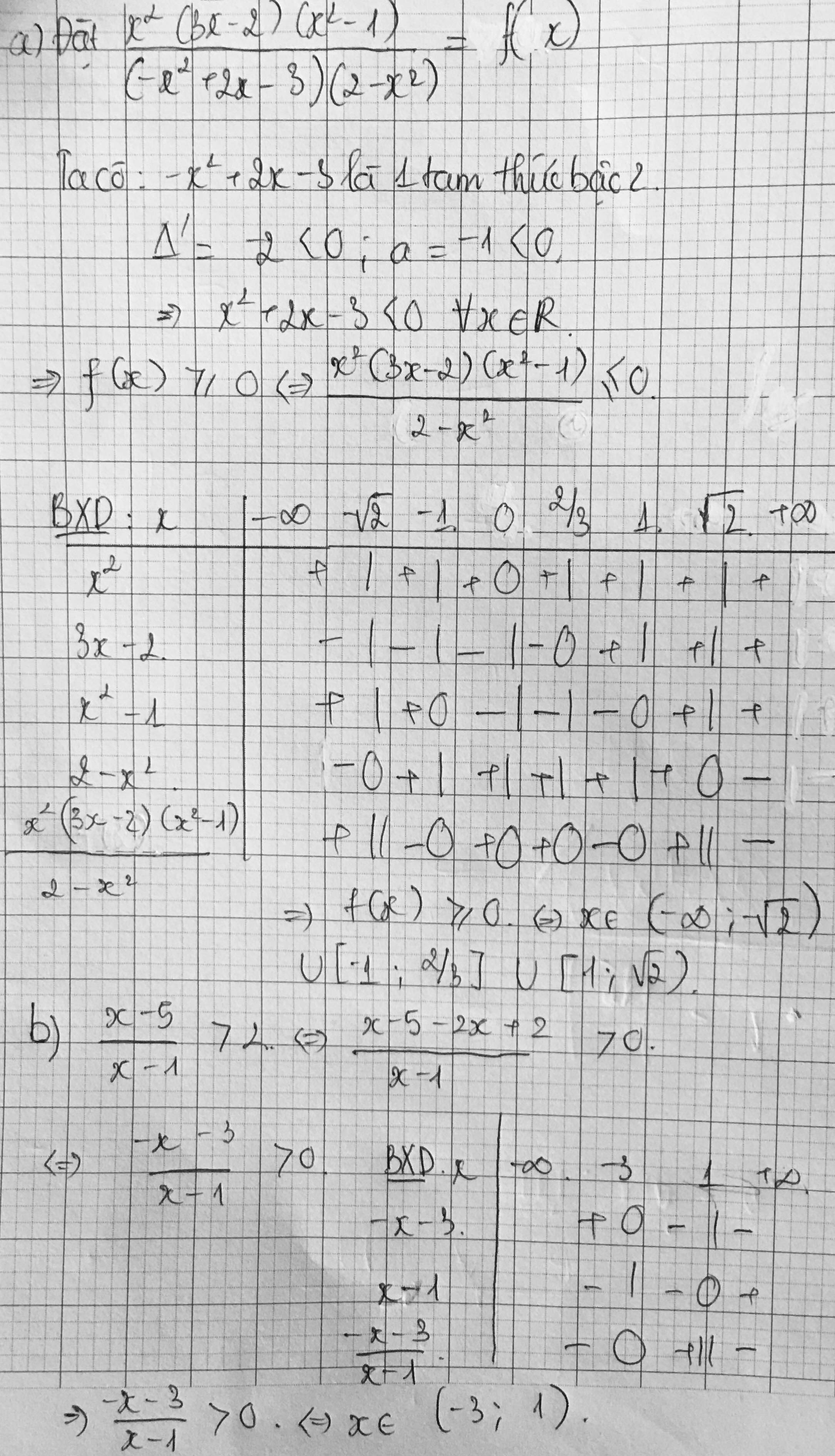Giải phương trình: \(3x^2+4x^2-6=2\left(x^2+2x-\frac{2}{x}\right)\sqrt{x^3+x^2-2}\) giải luôn giúp e với ạ
Hãy nhập câu hỏi của bạn vào đây, nếu là tài khoản VIP, bạn sẽ được ưu tiên trả lời.


Em thử nha,sai thì thôi ạ.
2/ ĐK: \(-2\le x\le2\)
PT \(\Leftrightarrow\sqrt{2x+4}-\sqrt{8-4x}=\frac{6x-4}{\sqrt{x^2+4}}\)
Nhân liên hợp zô: với chú ý rằng \(\sqrt{2x+4}+\sqrt{8-4x}>0\) với mọi x thỏa mãn đk
PT \(\Leftrightarrow\frac{6x-4}{\sqrt{2x+4}+\sqrt{8-4x}}-\frac{6x-4}{\sqrt{x^2+4}}=0\)
\(\Leftrightarrow\left(6x-4\right)\left(\frac{1}{\sqrt{2x+4}+\sqrt{8-4x}}-\frac{1}{\sqrt{x^2+4}}\right)=0\)
Tới đây thì em chịu chỗ xử lí cái ngoặc to rồi..
1.\(\left(\sqrt{x+3}-\sqrt{x+1}\right)\left(x^2+\sqrt{x^2+4x+3}\right)=2x\)
ĐK \(x\ge-1\)
Nhân liên hợp ta có
\(\left(x+3-x-1\right)\left(x^2+\sqrt{x^2+4x+3}\right)=2x\left(\sqrt{x+3}+\sqrt{x+1}\right)\)
<=>\(x^2+\sqrt{\left(x+1\right)\left(x+3\right)}=x\left(\sqrt{x+3}+\sqrt{x+1}\right)\)
<=> \(\left(x^2-x\sqrt{x+3}\right)+\left(\sqrt{\left(x+1\right)\left(x+3\right)}-x\sqrt{x+1}\right)=0\)
<=> \(\left(x-\sqrt{x+3}\right)\left(x-\sqrt{x+1}\right)=0\)
<=> \(\orbr{\begin{cases}x=\sqrt{x+3}\\x=\sqrt{x+1}\end{cases}}\)
=> \(x\in\left\{\frac{1+\sqrt{13}}{2};\frac{1+\sqrt{5}}{2}\right\}\)
Vậy \(x\in\left\{\frac{1+\sqrt{13}}{2};\frac{1+\sqrt{5}}{2}\right\}\)

1) đkxđ \(\left\{{}\begin{matrix}x\ge\dfrac{3}{2}\\y\ge0\end{matrix}\right.\)
Xét biểu thức \(P=x^3+y^3+7xy\left(x+y\right)\)
\(P=\left(x+y\right)^3+4xy\left(x+y\right)\)
\(P\ge4\sqrt{xy}\left(x+y\right)^2\)
Ta sẽ chứng minh \(4\sqrt{xy}\left(x+y\right)^2\ge8xy\sqrt{2\left(x^2+y^2\right)}\) (*)
Thật vậy, (*)
\(\Leftrightarrow\left(x+y\right)^2\ge2\sqrt{2xy\left(x^2+y^2\right)}\)
\(\Leftrightarrow\left(x+y\right)^4\ge8xy\left(x^2+y^2\right)\)
\(\Leftrightarrow x^4+y^4+6x^2y^2\ge4xy\left(x^2+y^2\right)\) (**)
Áp dụng BĐT Cô-si, ta được:
VT(**) \(=\left(x^2+y^2\right)^2+4x^2y^2\ge4xy\left(x^2+y^2\right)\)\(=\) VP(**)
Vậy (**) đúng \(\Rightarrowđpcm\). Do đó, để đẳng thức xảy ra thì \(x=y\).
Thế vào pt đầu tiên, ta được \(\sqrt{2x-3}-\sqrt{x}=2x-6\)
\(\Leftrightarrow\dfrac{x-3}{\sqrt{2x-3}+\sqrt{x}}=2\left(x-3\right)\)
\(\Leftrightarrow\left[{}\begin{matrix}x=3\left(nhận\right)\\\dfrac{1}{\sqrt{2x-3}+\sqrt{x}}=2\end{matrix}\right.\)
Rõ ràng với \(x\ge\dfrac{3}{2}\) thì \(\dfrac{1}{\sqrt{2x-3}+\sqrt{x}}\le\dfrac{1}{\sqrt{\dfrac{2.3}{2}-3}+\sqrt{\dfrac{3}{2}}}< 2\) nên ta chỉ xét TH \(x=3\Rightarrow y=3\) (nhận)
Vậy hệ pt đã cho có nghiệm duy nhất \(\left(x;y\right)=\left(3;3\right)\)

a) \(x^3-4x^2-5x+6=\sqrt[3]{7x^2+9x-4}\)
\(\Leftrightarrow-7x^2-9x+4+x^3+3x^2+4x+2=\sqrt[3]{7x^2+9x-4}\)
\(\Leftrightarrow-\left(7x^2+9x-4\right)+\left(x+1\right)^3+x+1=\sqrt[3]{7x^2+9x-4}\) (*)
Đặt \(\sqrt[3]{7x^2+9x-4}=a;x+1=b\)
Khi đó (*) \(\Leftrightarrow-a^3+b^3+b=a\)
\(\Leftrightarrow\left(b-a\right).\left(b^2+ab+a^2+1\right)=0\)
\(\Leftrightarrow b=a\)
Hay \(x+1=\sqrt[3]{7x^2+9x-4}\)
\(\Leftrightarrow\left(x+1\right)^3=7x^2+9x-4\)
\(\Leftrightarrow x^3-4x^2-6x+5=0\)
\(\Leftrightarrow x^3-4x^2-5x-x+5=0\)
\(\Leftrightarrow\left(x-5\right)\left(x^2+x-1\right)=0\)
\(\Leftrightarrow\left[{}\begin{matrix}x=5\\x=\dfrac{-1\pm\sqrt{5}}{2}\end{matrix}\right.\)

\(x^2-3x+\frac{7}{2}=\sqrt{\left(x^2-2x+2\right)\left(x^2-4x+5\right)}\)
\(\Leftrightarrow2x^2-6x+7=2\sqrt{\left(x^2-2x+2\right)\left(x^2-4x+5\right)}\)
Đặt \(\hept{\begin{cases}\sqrt{x^2-2x+2}=a>0\\\sqrt{x^2-4x+5}=b>0\end{cases}}\)
\(\Rightarrow a^2+b^2=2ab\)
\(\Leftrightarrow\left(a-b\right)^2=0\)
\(\Leftrightarrow a=b\)
\(\Leftrightarrow\sqrt{x^2-2x+2}=\sqrt{x^2-4x+5}\)
\(\Leftrightarrow2x=3\)
\(\Leftrightarrow x=\frac{3}{2}\)
\(x^2-3x+\frac{7}{2}=\sqrt{\left(x^2-2x+2\right)\left(x^2-4x+5\right)}\)
\(\Leftrightarrow x^2-3x+\frac{7}{2}-\frac{5}{4}=\sqrt{\left(x^2-2x+2\right)\left(x^2-4x+5\right)}-\frac{5}{4}\)
\(\Leftrightarrow\frac{4x^2-12x+9}{4}=\frac{\left(x^2-2x+2\right)\left(x^2-4x+5\right)-\frac{25}{16}}{\sqrt{\left(x^2-2x+2\right)\left(x^2-4x+5\right)}+\frac{5}{4}}\)
\(\Leftrightarrow\frac{\left(2x-3\right)^2}{4}-\frac{x^4-6x^3+15x^2-18x+10-\frac{25}{16}}{\sqrt{\left(x^2-2x+2\right)\left(x^2-4x+5\right)}+\frac{5}{4}}=0\)
\(\Leftrightarrow\frac{\left(2x-3\right)^2}{4}-\frac{\frac{16x^4-96x^3+240x^2-288x+135}{16}}{\sqrt{\left(x^2-2x+2\right)\left(x^2-4x+5\right)}+\frac{5}{4}}=0\)
\(\Leftrightarrow\frac{\left(2x-3\right)^2}{4}-\frac{\frac{\left(2x-3\right)^2\left(4x^2-12x+15\right)}{16}}{\sqrt{\left(x^2-2x+2\right)\left(x^2-4x+5\right)}+\frac{5}{4}}=0\)
\(\Leftrightarrow\left(2x-3\right)^2\left(\frac{1}{4}-\frac{\frac{4x^2-12x+15}{16}}{\sqrt{\left(x^2-2x+2\right)\left(x^2-4x+5\right)}+\frac{5}{4}}\right)=0\)
\(\Rightarrow x=\frac{3}{2}\)
Bài làm của mk cho ai khùng thôi, bn tham khảo cx dc :v

Câu 4:
Giả sử điều cần chứng minh là đúng
\(\Rightarrow x=y\), thay vào điều kiện ở đề bài, ta được:
\(\sqrt{x+2014}+\sqrt{2015-x}-\sqrt{2014-x}=\sqrt{x+2014}+\sqrt{2015-x}-\sqrt{2014-x}\) (luôn đúng)
Vậy điều cần chứng minh là đúng
2) \(\sqrt{x^2-5x+4}+2\sqrt{x+5}=2\sqrt{x-4}+\sqrt{x^2+4x-5}\)
⇔ \(\sqrt{\left(x-4\right)\left(x-1\right)}-2\sqrt{x-4}+2\sqrt{x+5}-\sqrt{\left(x+5\right)\left(x-1\right)}=0\)
⇔ \(\sqrt{x-4}.\left(\sqrt{x-1}-2\right)-\sqrt{x+5}\left(\sqrt{x-1}-2\right)=0\)
⇔ \(\left(\sqrt{x-4}-\sqrt{x+5}\right)\left(\sqrt{x-1}-2\right)=0\)
⇔ \(\left[{}\begin{matrix}\sqrt{x-4}-\sqrt{x+5}=0\\\sqrt{x-1}-2=0\end{matrix}\right.\)
⇔ \(\left[{}\begin{matrix}\sqrt{x-4}=\sqrt{x+5}\\\sqrt{x-1}=2\end{matrix}\right.\)
⇔ \(\left[{}\begin{matrix}x\in\varnothing\\x=5\end{matrix}\right.\)
⇔ x = 5
Vậy S = {5}
